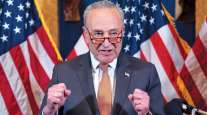Associated Press
Negotiators Near Agreement on Long-Delayed COVID-19 Aid Bill

[Ensure you have all the info you need in these unprecedented times. Subscribe now.]
WASHINGTON — Top congressional leaders are closing in on an agreement on a long-delayed COVID-19 relief package, hoping to seal a deal as early as Dec. 16 that would extend aid to individuals and businesses and help ship coronavirus vaccines to millions.
Sen. Joe Manchin (D-W.Va.), a coauthor of a $908 billion bipartisan package, said leadership negotiators are nearing an agreement that would extend direct payments of $500-$600 to most Americans but would deny Democratic negotiators long-sought aid to state and local governments.
“We made major headway toward hammering out a bipartisan relief package,” said Senate Majority Leader Mitch McConnell (R-Ky).
The negotiators are closing in on an agreement of around $900 billion, which would include a new round of stimulus checks, enhanced federal unemployment insurance benefits, and other avenues for delivering aid to states, localities, territories and tribes, according to two people familiar with the talks and authorized to characterize them. Their statement said that a GOP-sought provision shielding businesses from COVID-19-related lawsuits would be dropped.
“I think they’re basically now putting it all together,” Manchin said on CNN. “We were able to break the gridlock.”
Other aides following the talks offered more cautious assessments. The emerging package is serving as a magnet for add-ons, and the two sides continue to swap offers.
It is also apparent that another temporary spending bill will be needed to prevent a government shutdown at midnight on Dec. 18. That is likely to easily pass.
House lawmakers returned to Washington on Dec. 16 in hopes of voting soon on the emerging package, which would combine the $900 billion in COVID-19 relief with a $1.4 trillion governmentwide funding bill and a host of other remaining congressional business.

House Speaker Nancy Pelosi (D-Calif.) has insisted for months that state and local aid would be in any final bill, but as time is running out, Democrats appear unwilling to hold the rest of the package hostage over the demand. (Manuel Balce Ceneta/Associated Press)
A new edict from House Speaker Nancy Pelosi (D-Calif.) requires members to wear masks at all times on the House floor, including while speaking.
Negotiations on COVID-19 relief intensified Dec. 15 after months of futility. The top Democratic and Republican leaders of Congress met twice in hopes of finally cementing a leadership agreement that would revive subsidies for businesses hit hard by the pandemic, help distribute new coronavirus vaccines, fund schools and renew soon-to-expire jobless benefits.
Republicans labored to keep the price tag for the long-delayed rescue package in check, seeking to prevail in a battle over help for state and local governments, while capping the cost of bonus jobless benefits and direct payments sought by Democrats.
After two meetings in Pelosi’s Capitol suite, where Democrats pressed for more generous steps such as direct payments, House Minority Leader Kevin McCarthy (R-Calif.), gave an upbeat assessment.
“I think we’ve built a lot of trust,” McCarthy said. “I think we’re moving in the right direction. I think there’s a possibility of getting it done.”
The uptick in activity could be a sign that an agreement is near, though COVID-19 relief talks have been notoriously difficult.
Pressure for a deal is intense. Unemployment benefits run out Dec. 26 for more than 10 million people. Many businesses are barely hanging on after nine pandemic-stricken months. And money is needed to distribute new vaccines that are finally offering hope for returning the country to normal.

Senate Majority Leader Mitch McConnell (R-Ky) said recently, “We made major headway toward hammering out a bipartisan relief package." (Susan Walsh/Associated Press)
McConnell is playing a strong hand in the lame-duck session and pushed hard to get Democrats to drop a $160 billion state and local government aid package. Several senior Democrats, including close allies of President-elect Joe Biden, have said they would move along now and fight for the aid next year. Democrats cited other gains for states and localities in the emerging deal such as help for transit systems and vaccine distribution.
Pelosi has insisted for months that state and local aid would be in any final bill, but as time is running out, Democrats appear unwilling to hold the rest of the package hostage over the demand.
“We’re not going home until this is done,” Manchin said on CNN on Dec. 15. ”We’ve got to get people a lifeline.”
Manchin is an architect of a bipartisan $748 billion aid package that is aimed at serving as a template for the leadership talks. President Donald Trump’s chief negotiator, Treasury Secretary Steven Mnuchin, supports a package with many similar elements. There is also bipartisan support for transportation and transit assistance, funding for rural internet service and help for the Postal Service, among other provisions.
Lawmakers also worked to finalize a catchall funding package that will be the basis for the last significant legislation of the Trump presidency.
Want more news? Listen to today's daily briefing:
Subscribe: Apple Podcasts | Spotify | Amazon Alexa | Google Assistant | More




